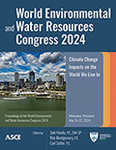Revisiting the Basics: The Role of Advanced Treatment for PFAS (Forever Chemicals) Removal
Publication: World Environmental and Water Resources Congress 2024
ABSTRACT
Per- and polyfluoroalkyl substances (PFAS) are a group of man-made chemicals that are persistent in the environment and have been found in soil, water, air, and living organisms. PFAS have been linked to a range of health problems, including cancer, thyroid disease, and developmental effects on fetuses and infants. As a result, there is a growing need for effective treatment methods to remove PFAS from contaminated water sources. This abstract presents an overview of PFAS fundamentals and treatment options. It begins with an introduction to PFAS, including their sources, uses, and health effects. The focus then shifts to PFAS treatment methods, which can be broadly categorized as physical, chemical, and biological. Physical treatment options include adsorption, membrane filtration, and advanced oxidation processes, while chemical treatments include ion exchange, precipitation, and coagulation/flocculation. Biological treatment methods, such as bioremediation and phytoremediation, are less commonly used for PFAS removal but have shown promise in laboratory settings. The effectiveness of PFAS treatment methods depends on several factors, including the type and concentration of PFAS, the presence of other contaminants, and the specific treatment technology used. Some treatment methods, such as granular activated carbon (GAC) adsorption, have been widely adopted and are effective for a range of PFAS compounds. Other methods, such as membrane filtration, may require pre-treatment to remove particulate matter and other fouling agents. Overall, there is a need for continued research and development of PFAS treatment technologies to address the growing threat of PFAS contamination in water sources. Advances in materials science, chemistry, and microbiology offer promising avenues for improving the efficiency, effectiveness, and scalability of PFAS treatment methods.
Get full access to this chapter
View all available purchase options and get full access to this chapter.
REFERENCES
USEPA. (2022, October). Per- and Polyfluoroalkyl Substances (PFAS) Treatment Technologies. Retrieved from https://www.epa.gov/sdwa/drinking-water-health-advisories-pfoa-and-pfos.
Interstate Technology Regulatory Council. (2020). Treatment Technologies for PFAS Removal from Drinking Water. Retrieved from https://itrcweb.org/teams/active/pfas.
National Academies of Sciences, Engineering, and Medicine. (2020). Addressing PFAS in Drinking Water: A Review of Current Knowledge and Recommendations for Research and Action. Retrieved from https://nap.nationalacademies.org/catalog/26156/guidance-on-pfas-exposure-testing-and-clinical-follow-up.
USEPA. (2022, November). Per- and Polyfluoroalkyl Substances (PFAS). Retrieved from https://www.epa.gov/sdwa/drinking-water-health-advisories-pfoa-and-pfos.
Agency for Toxic Substances and Disease Registry. (2023, July). Per- and Polyfluoroalkyl Substances (PFAS).
ITRC Web. (2023). Fact Sheets - PFAS - Per- and Polyfluoroalkyl Substances (itrcweb.org).
EPA. (2021). PITT Research Brief Electrochemiacl Oxidation (epa.gov).
EPA. (2021b). PITT Research Brief SCWO (epa.gov).
Enviro.wiki. (2022). PFAS Ex Situ Water Treatment - Enviro Wiki.
Information & Authors
Information
Published In
History
Published online: May 16, 2024
ASCE Technical Topics:
- Biological processes
- Business management
- Chemical treatment
- Cooling (wastewater treatment)
- Diseases
- Environmental engineering
- Geomechanics
- Geotechnical engineering
- Health hazards
- Pollution
- Practice and Profession
- Public administration
- Public health and safety
- Soil mechanics
- Soil pollution
- Soil properties
- Soil treatment
- Soil water
- Waste management
- Waste treatment
- Water pollution
- Water treatment
Authors
Metrics & Citations
Metrics
Citations
Download citation
If you have the appropriate software installed, you can download article citation data to the citation manager of your choice. Simply select your manager software from the list below and click Download.
